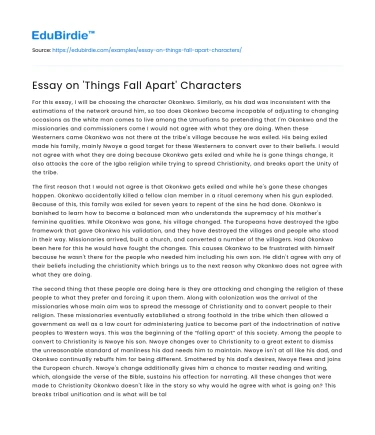Introduction
Chinua Achebe's seminal novel, Things Fall Apart, serves as a profound exploration of pre-colonial African life and the cataclysmic disruptions brought about by European colonization. Central to the novel's enduring impact are its richly drawn characters, whose complexities reflect the broader cultural and individual tensions of the time. This essay delves into the intricate characterizations within Things Fall Apart, focusing on how these figures embody and challenge the socio-cultural dynamics of the Igbo society. Achebe's characters are not merely vessels for storytelling; they are emblematic of broader human experiences, their struggles and triumphs resonating with readers across cultural and temporal divides. By examining the novel's characters, this essay seeks to illuminate how Achebe uses personal narratives to comment on broader societal changes, providing a lens through which the impact of colonization on traditional African societies can be better understood.
Okonkwo: Tragic Hero and Cultural Symbol
At the heart of Things Fall Apart lies Okonkwo, whose life is a tapestry of ambition, fear, and defiance. Okonkwo is a quintessential tragic hero, whose personal and cultural conflicts drive the narrative. His character is deeply rooted in the values of strength, masculinity, and social status, traits that are both his driving force and his downfall. Achebe uses Okonkwo to personify the tension between tradition and change. As Okonkwo strives to overcome the legacy of his father's perceived weakness, he becomes a symbol of resistance against the emasculating forces of colonization. His fear of being perceived as weak motivates his harshness and impetuous actions, such as the killing of Ikemefuna, which foreshadows his eventual downfall.
Save your time!
We can take care of your essay
- Proper editing and formatting
- Free revision, title page, and bibliography
- Flexible prices and money-back guarantee
Achebe writes, "Okonkwo's fear was greater than these. It was not external but lay deep within himself. It was the fear of himself, lest he should be found to resemble his father" (Achebe, 1958). This internal conflict is emblematic of the broader cultural clash faced by the Igbo society. As the narrative unfolds, Okonkwo's inability to adapt to the changing socio-political landscape leads to his tragic end. His suicide signifies not only personal defeat but also the collapse of traditional Igbo society under colonial influence. This portrayal echoes real-life historical tensions where indigenous cultures confronted the imposition of foreign ideologies.
Secondary Characters and Their Significance
While Okonkwo dominates the narrative, Achebe's secondary characters are equally instrumental in conveying the novel's themes. Characters such as Nwoye, Ekwefi, and Obierika add layers of complexity to the societal portrait Achebe paints. Nwoye, Okonkwo's son, represents the younger generation's struggle with identity and the allure of new beliefs. His eventual conversion to Christianity signifies a generational shift and highlights the transformative impact of colonialism. Unlike his father, Nwoye finds solace in the new religion, which offers a refuge from his father's rigid expectations and the oppressive aspects of traditional Igbo culture.
Ekwefi, Okonkwo's second wife, embodies resilience and maternal strength. Her relationship with her daughter Ezinma showcases the importance of female bonds in a patriarchal society. Despite the limited roles assigned to women, Ekwefi's character challenges the traditional gender norms, providing a counter-narrative to Okonkwo's hyper-masculinity. Obierika, Okonkwo's close friend, serves as a voice of reason and reflection. His pragmatic approach to the changes occurring in Umuofia contrasts with Okonkwo's obstinacy, offering a more nuanced perspective on the cultural transformation. Through these characters, Achebe presents a multifaceted depiction of Igbo society, illustrating the diverse responses to colonial encroachment.
Counter-Arguments and Their Rebuttal
Critics might argue that Achebe's focus on the male characters in Things Fall Apart overlooks the potential for a more balanced exploration of gender dynamics. However, this perspective underestimates the subtlety with which Achebe addresses gender through characters like Ekwefi and Ezinma. Their narratives, while not as prominent as Okonkwo's, are crucial in highlighting the silent yet potent influence of women within the Igbo community. Furthermore, some may contend that Okonkwo's characterization is too rigid, lacking the nuance necessary for a fully realized protagonist. Yet, it is precisely Okonkwo's rigidity that underscores the broader theme of cultural inflexibility in the face of inevitable change.
Achebe's portrayal of Okonkwo’s downfall is a deliberate narrative choice, illustrating the tragic consequences of an inability to adapt. In fact, the starkness of Okonkwo's character serves to amplify the contrast with more adaptable figures like Nwoye and Obierika, thereby enriching the novel’s exploration of cultural resilience and transformation. By addressing these counter-arguments, this essay reaffirms the depth and intentionality of Achebe's characterizations, which serve to enhance the novel's thematic resonance and cultural critique.
Conclusion
In conclusion, the characters in Chinua Achebe's Things Fall Apart are integral to the novel's examination of cultural and individual transformation. Through Okonkwo, Achebe explores the tragic dimensions of cultural inflexibility and personal pride, while the secondary characters provide a broader spectrum of responses to colonial influence. The novel's enduring relevance lies in its ability to capture the complexities of human experience amidst societal upheaval. Achebe's characters are not merely conduits for narrative progression; they are vibrant, multifaceted individuals whose stories reflect the broader historical and cultural shifts of their time. By engaging with both primary and secondary characters, Achebe offers a nuanced portrayal of a society in transition, inviting readers to reflect on the universal themes of change, identity, and resilience.






 Stuck on your essay?
Stuck on your essay?

